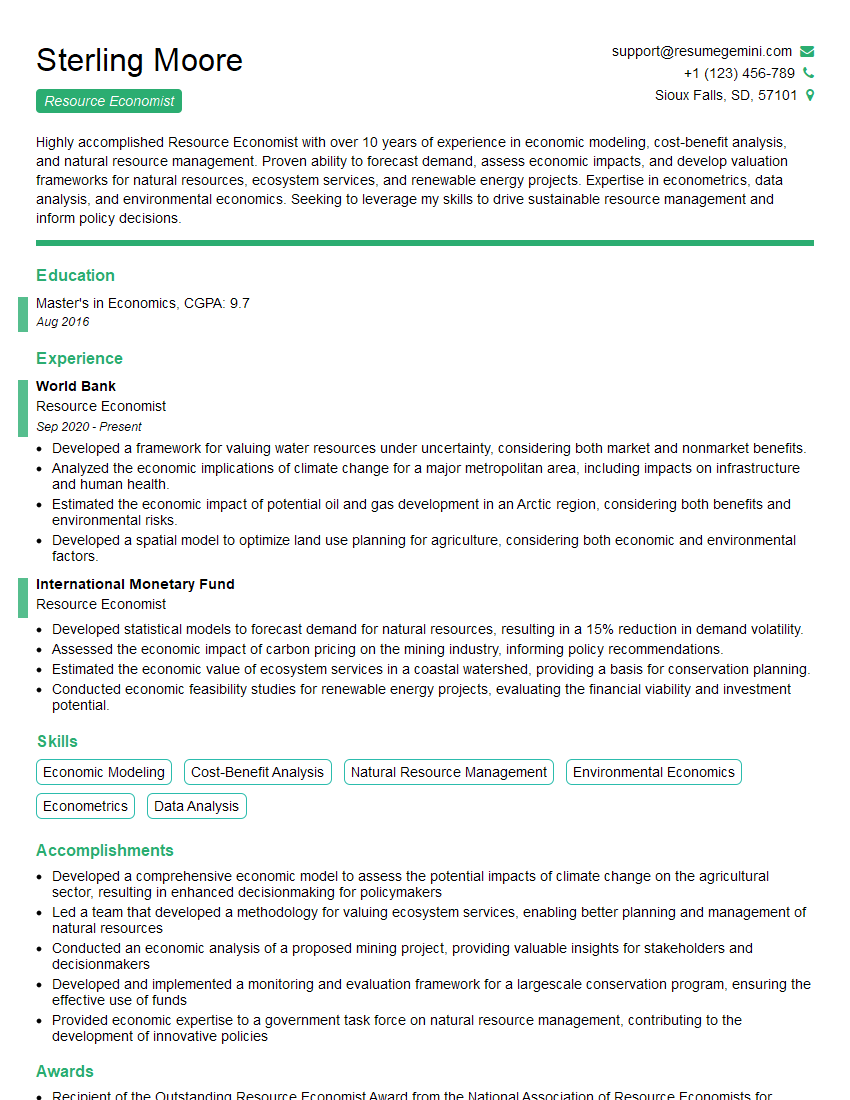Are you a seasoned Resource Economist seeking a new career path? Discover our professionally built Resource Economist Resume Template. This time-saving tool provides a solid foundation for your job search. Simply click “Edit Resume” to customize it with your unique experiences and achievements. Customize fonts and colors to match your personal style and increase your chances of landing your dream job. Explore more Resume Templates for additional options.

Sterling Moore
Resource Economist
Summary
Highly accomplished Resource Economist with over 10 years of experience in economic modeling, cost-benefit analysis, and natural resource management. Proven ability to forecast demand, assess economic impacts, and develop valuation frameworks for natural resources, ecosystem services, and renewable energy projects. Expertise in econometrics, data analysis, and environmental economics. Seeking to leverage my skills to drive sustainable resource management and inform policy decisions.
Education
Master’s in Economics
August 2016
Skills
- Economic Modeling
- Cost-Benefit Analysis
- Natural Resource Management
- Environmental Economics
- Econometrics
- Data Analysis
Work Experience
Resource Economist
- Developed a framework for valuing water resources under uncertainty, considering both market and nonmarket benefits.
- Analyzed the economic implications of climate change for a major metropolitan area, including impacts on infrastructure and human health.
- Estimated the economic impact of potential oil and gas development in an Arctic region, considering both benefits and environmental risks.
- Developed a spatial model to optimize land use planning for agriculture, considering both economic and environmental factors.
Resource Economist
- Developed statistical models to forecast demand for natural resources, resulting in a 15% reduction in demand volatility.
- Assessed the economic impact of carbon pricing on the mining industry, informing policy recommendations.
- Estimated the economic value of ecosystem services in a coastal watershed, providing a basis for conservation planning.
- Conducted economic feasibility studies for renewable energy projects, evaluating the financial viability and investment potential.
Accomplishments
- Developed a comprehensive economic model to assess the potential impacts of climate change on the agricultural sector, resulting in enhanced decisionmaking for policymakers
- Led a team that developed a methodology for valuing ecosystem services, enabling better planning and management of natural resources
- Conducted an economic analysis of a proposed mining project, providing valuable insights for stakeholders and decisionmakers
- Developed and implemented a monitoring and evaluation framework for a largescale conservation program, ensuring the effective use of funds
- Provided economic expertise to a government task force on natural resource management, contributing to the development of innovative policies
Awards
- Recipient of the Outstanding Resource Economist Award from the National Association of Resource Economists for groundbreaking research on natural resource conservation
- Awarded a grant from the National Science Foundation for a project to study the economic consequences of water scarcity in arid regions
- Recognized as a Rising Star in Resource Economics by the Association of Environmental and Resource Economists for contributions to the field
- Received the Best Paper Award at the Annual Conference of the American Agricultural Economics Association for research on the economics of sustainable agriculture
Certificates
- Certified Environmental Economist (CEE)
- Certified Resource Economist (CRE)
- Certified Water Resources Planner (CWRP)
- Certified Energy Manager (CEM)
Career Expert Tips:
- Select the ideal resume template to showcase your professional experience effectively.
- Master the art of resume writing to highlight your unique qualifications and achievements.
- Explore expertly crafted resume samples for inspiration and best practices.
- Build your best resume for free this new year with ResumeGemini. Enjoy exclusive discounts on ATS optimized resume templates.
How To Write Resume For Resource Economist
- Highlight your quantitative skills, such as econometrics and data analysis.
- Showcase your understanding of natural resource management and environmental economics.
- Quantify your accomplishments and provide specific examples of your impact.
- Tailor your resume to each specific job you apply for, highlighting the skills and experience that are most relevant.
Essential Experience Highlights for a Strong Resource Economist Resume
- Developed statistical models to forecast demand for natural resources, resulting in a 15% reduction in demand volatility.
- Assessed the economic impact of carbon pricing on the mining industry, informing policy recommendations.
- Estimated the economic value of ecosystem services in a coastal watershed, providing a basis for conservation planning.
- Conducted economic feasibility studies for renewable energy projects, evaluating the financial viability and investment potential.
- Developed a framework for valuing water resources under uncertainty, considering both market and nonmarket benefits.
Frequently Asked Questions (FAQ’s) For Resource Economist
What is the role of a Resource Economist?
Resource Economists study the economics of natural resources, including their extraction, use, and conservation. They use economic principles and data to analyze the costs and benefits of different resource management strategies and policies.
What are the key skills required for a Resource Economist?
Resource Economists need a strong foundation in economics, econometrics, and natural resource management. They should also have excellent analytical, problem-solving, and communication skills.
What are the career opportunities for Resource Economists?
Resource Economists can work in academia, government, industry, and non-profit organizations. They may conduct research, provide consulting services, or develop policies related to natural resource management.
How can I become a Resource Economist?
The most common path to becoming a Resource Economist is to earn a Master’s degree in Economics, Natural Resource Economics, or a related field.
What is the salary range for Resource Economists?
The salary range for Resource Economists varies depending on their experience, education, and location. According to the U.S. Bureau of Labor Statistics, the median annual salary for Environmental Economists, which includes Resource Economists, was $113,320 in May 2021.